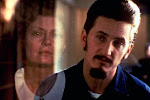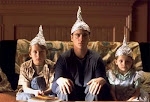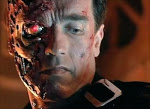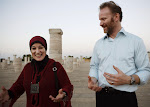
(Warning: Plot Spoilers!)
Cecilia and Robbie grow up together. Then they discovered that they are madly in love. They would have gotten married as soon as possible had not a young girl named Briony ruined both of their lives by wrongfully accusing Robbie of rape. By the time Briony gets the stones to own up to her mistake, Robbie and Cecilia have already died. In particular, Robbie dies in a war in which his wrongful accusations forced him to take part. Since they're already dead, Briony see no harm in putting off her confession until the last possible moment.
On a brighter note, Briony uses her self-loathing and regret to fuel a long and successful writing career. Atonement is her final novel. She is forced to record this off-handed confession because, alas, she is dying of old age and this is the last chance she's going to get. However she writes the story with one major change to the ending: "Cecilia and Robbie get the happy ending they deserved." This is her atonement for destroying their lives. The end.
Atonement reminded me that true atonement is extremely hard to come by. Briony dedicated much of her life to atoning for her sins but even that fell short.
Sin is more serious than we will ever comprehend. The fact that Jesus Christ, the Son of God, had to suffer and die to atone for our sins should scare us. We cannot imagine the lengths God went to by sacrificing His Son for us, especially since we would never have humbled ourselves to even ask for this forgiveness, especially since we will never fully appreciate this sacrifice (at least not in this life). But God did it anyway because He is God. He saved us despite ourselves.
Briony had a whole lifetime to think about atonement yet she never found it. She worked harder than most to obtain it but still never succeeded. In this way, true atonement requires less from us than we might imagine. From one point of view, atonement is simple, maybe even easy to obtain. All we have to do is ask God for it. From another point of view, atonement is unfathomably difficult to obtain, as Christ went to such lengths to obtain it for us.
Atonement
![]()
![]() Tags:
Atonement,
James McAvoy,
Keira Knightley
Tags:
Atonement,
James McAvoy,
Keira Knightley
Subscribe to:
Post Comments (Atom)

























9 comments:
The hymn sung in the movie was so pertinent. " Dear God and Father of mankind forgive our foolish ways...
I believe that that is the beauty of Christianity. As human beings we are flawed and we make mistakes, but God loves us and all we have to do is say we are sorry (and mean it) and try not to do it again and God will forgive us. Boy, do I need to be forgiven.
In your response to Atonement you express a longing to enfold Briony’s personal and ultimately failed gesture of atonement within the atonement of Christ. The gospel offers a meta-atonement in the sense of being a once-for-all, fully efficacious means of dealing with guilt. Certainly McEwan presents the story of a tragically flawed human atonement supporting your response.
But McEwan also invites the reader to see in Atonement the other sort of ironic, postmodern meta-atonement. An efficacious act of personal atonement turns out to be a fiction, and Briony knew it all along. A reader with postmodern sensibilities could turn the Christian critique on its head. The atonement in the novel/movie is a metaphorical commentary on the Biblical atonement: a fiction, a pretty story intended to provide closure and a happy ending that turns out not to be historically true. As long as one lives inside the narrative one can find comfort and a clean conscience, but as soon as the meta-narrator arrives on the scene the blessed assurance begins to disintegrate.
The alternative metanarrative interpretations of McEwan’s Atonement illustrate the postmodern situation in which contemporary Christians find themselves immersed. Dismantling illusion is a worthy endeavor, but what is revealed in the aftermath? Do we at last encounter the solid truths that survive the destruction, or are we left to pick our way through the ruins? Whichever proves to be the case, it becomes increasingly difficult to live inside the estate without feeling the engines of war rumbling toward the walls.
I think you are missing a huge part in this story. If anything, I think it is a warning about letting yourself be blinded by your sense of right and wrong. Briony is so swept up in her (appropriately childlike) romantic notions of sex and propriety that she ignores what is right in front of her. She has this preconception of Robbie (based on the vulgar note he sent) that makes him a villain to her-- the only person capable of such evil.
I can take away two lessons from this. One is about the way children are taught and treated. In the time and place Briony is raised, lust can only be interpreted as evilness and everything is black and white. Lust towards one woman is indicative that Robbie is capable of any other evil. Finally, despite Briony's age and ignorance, her testimony is taken as absolute truth and condemns Robbie against all physical evidence.
The second lesson comes from identifying with Briony. Judge not. One display of weakness is hardly grounds for condemnation. Even in her own story when Cee and Robbie survive Briony is not forgiven. The easy judgements, the white lie that you think is justified, those are the things that you can never live down. Briony never forgives herself. We are all guilty of something, but we hope it isn't the
trait that defines us.
By the time Briony gets the stones to own up to her mistake, Robbie and Cecilia have already died. In particular, Robbie dies in a war in which his wrongful accusations forced him to take part. Since they're already dead, Briony see no harm in putting off her confession until the last possible moment.
thx for the input abby-wan
notice that i never said, "there is no other interpretation than the one which i have thus put forth." the purpose of my reviews is not to reveal every facet of possibility in different movies... that would be boring to read anyway.
Briony is swept up in her fanciful daydreams, true, but notice how she deliberately pried into Robbie and Cecilia's affairs. And she lied to the police officer about Robbie... she did not see him rape that girl.
By "judge not?" do you mean, "blame the parents (or the system)" or do you mean, "don't ever define what is right and wrong"?
i agree that mercy is necessary since we are all imperfect (God Himself came up with that idea). But mercy is pointless unless we are willing to acknowledge what is right and wrong in the first place. The only other option is denial, which gets us nowhere.
it takes genuine courage to own up to one's mistakes, a courage which Briony lacked. feeling bad about it her whole life and then writing a book about it at the tail end of her life was the easy way out.
In McEwan's novel, Briony never publishes her book because she cannot indemnify Paul & Lola Marshall without being sued for libel. Briony also reveals that she wrote four different drafts of the story throughout her lifetime - a lifetime of atonement, then, a process which she will not see come to fruition because she will likely die before Lola.
I also appreciate the irony in Robbie's atonement. He atones the most - losing his career, his love, his freedom, his life - yet he is the innocent one.
cool, i've heard that the book resolves everything better than the movie (especially at the end).
but i don't think you can say Robbie atoned for anything if he was innocent in the first place. although for sure it was unjust that he had to go through so much for something he never did.
"i don't think you can say Robbie atoned for anything if he was innocent in the first place."
This would make him a Christlike figure,no? Christine offers an intriguing twist here.
Also, Robbie is the only working-class character in the book. It's the working class soldiers who have to atone for the hubris of upper-class politicians and their deep-pocket sponsors. Note that the real bad guy is Paul Marshall, the rapist who not only gets away with it but who winds up marrying his victim. He also becomes a war profiteer, making a fortune selling poor-quality chocolate bars to the government, which sends them off to the front as a morsel of cheap comfort to the working-class boys in the trenches. And Paul gets not only profit but commendation for helping the war effort -- a commercial rapist who garners the affections of his victims.
What fascinated me most about this story was the endless amount of possibility. Just like the old optical illusions where our brains connect the dots, Briony has filled in the holes for Robbie and Cecilia. Any moment on screen in which we do not see Briony is a moment she has created, whether or not she felt she had the proof to back it up.
We do not know if Robbie laughed when he wrote the explicit note, or if Cecilia was pleased with Robbie's actions in the library.
What we do know is he gave Briony the note, she saw them in a very compromising position, and she also throughout her life witnessed a woman agreeing to marry her rapist, as opposed to growing up and taking pains to never see him again. We are given the very convoluted (and realistic) idea that sometimes people are in such screwed up situations that they find themselves attracted to people others might find to be less than worthy. Robbie was falsely accused, but what kind of man was Robbie to begin with?
I loved this movie, though I don't know that I'll watch it many times.
Post a Comment